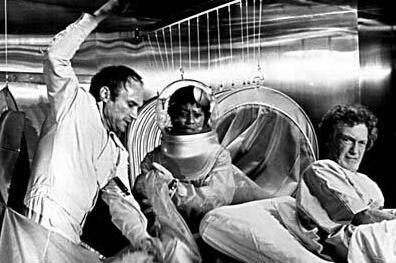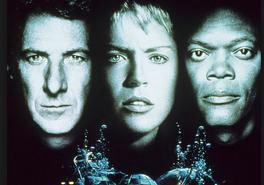Michael Crichton's 'Sphere': The Power of Positive Thinking
What a difference 27 years makes, huh? I’m referring to the gap between the 1971 film adaptation of Michael Crichton’s The Andromeda Strain and the 1998… whatever that was… of Sphere. I mean, we’re mostly going to be talking about Michael Crichton’s novels, but to prattle on happily for several paragraphs about Sphere without acknowledging what Barry Levinson did to it would be like not picturing a blue Billy Crudup in your head while re-reading Watchmen. We need to breathe through it, come to acceptance, and move on.
That was a shitty movie. And, to my earlier point about the gap between The Andromeda Strain and Sphere, here is what a team of scientists and hangers-on looked like on-camera in 1971:

And here is what they looked like in 1998:

Which, whatever, there are plenty of sexy scientists in the world (I mean, have you seen Lisa Randall? Rowr!) and Dustin Hoffman is not necessarily having panties thrown at him in recent years, but it legitimately was a time in which sci-fi movies tried to be about sci-fi. And you can say “it’s what the people want,” but Sphere made back less than half its budget and The Andromeda Strain made… I mean, it was 1971, so enough to pay for Sharon Stone’s wet suits on Sphere, probably, but no one was sitting on a $45 million dollar loss. The big ticket item? They spent $300K to build the scientific lab set. PRIORITIES, you know? And it made sense. Literally no human being who watched Sphere without reading the book understood what the hell was going on. Not one. You can tell me you did, but unless it happened in a controlled environment where you were raised in captivity away from Michael Crichton novels and then watched Sphere and answered a series of plot questions of my choosing, I’m going to think you’re snowing me. And that scenario would make for a fascinating Michael Crichton novel, would it not?
Speaking of! Let’s talk about Michael Crichton. Biography of Michael Crichton: he is now dead, he was super tall (6’9), he wrote well over 12,000 books, he was very smart, he got a little weird in later years, and we should all be worshipping his golden statue for having given us so much pleasure. Do you even know what you owe to Michael Crichton? How many flights he made bearable? How many rainy weekends at your aunt and uncle’s cottage where you weren’t allowed to flush pee? You may not really understand, let me go on: he gave you George Clooney. Did you know that? Did you know that he created “ER,” which gave you George Clooney? Westworld? JURASSIC PARK? CONGO?
(I may be the only one who really liked Congo, but I really really really hate and fear non-human primates other than Koko, and it was nice to have that reinforced a little bit. I know, I know, the humans made them that way to guard the whatever they were guarding. Still.)
Sphere is pretty great. I think, like most Crichton novels, you can see that tension between the Michael Crichton who, like Roman on “Party Down,” dreamed of writing hard sci-fi (no dragons!), but also knew that his bread-and-butter was cinematically-appropriate tales of the natural human reactions to an initial sci-fi concept. Which is what Robert J. Sawyer, the superb Canadian sci-fi writer, does as well. You’ve got the alien sphere, or the spreading contagion, or the rogue androids in Western wear, and what makes it a Crichton novel is making you care about the little band of people who has to deal with it.
To return to the fundamental question of Classic Trash, that we only reference when it seems convenient to the discussion: “is it any good?”
Well, yes. Crichton is not Alice Munro (though we can all fantasize about the end result of their collaboration, in which a young woman grows to adulthood in a small Western Canadian town and then encounters an alien sphere that gives her unconscious mind the power to create any manifestations she chooses) but he has that great talent the snobs lament: making you care what comes next. And then and then and then and then. You can be the purest of the pure sci-fi. You can understand cybernetics. You can create fake but super-plausible looking computer code and warning symbols that look scary and come up with something that makes it seem not-insane that we might reanimate cloned dinosaurs out of New Age jewelry-looking stones, but unless you have the intangible and rare ability to make someone miss their subway stop to figure out how the scientists can manage not to bring the threat back from the ocean in their own minds, you are never going to be able to afford to build a life-size replica of the Parthenon in your back forty. That’s just how it is. You think you’re better than JK Rowling? Maybe you are! It doesn’t mean shit. Give the people what they want, y’know?
We haven’t said much about Sphere, really, because who knows if you’ve read it? This is more about Michael Crichton. But it’s also a little bit about the failings of Michael Crichton, such as they are, because he’s never quite willing to go scorched-earth. Which is what happens at the end of Sphere. Our heroes need to kill themselves. Anyone could tell you that. And, instead, they use their newfound supernatural powers to choose to forget that they have those powers, rendering everyone safe and happy and innocent and bounding off, like the end of The Langoliers, to live the rest of their lives. And that’s why it’s a really fun book, and not, maybe, a more artistic book that ends with three dead bodies in a decompression chamber, or an explosion taking out the three survivors and the sphere itself, or a Russian woman woman being run over by a train.
The Plot Questions You Would Be Asked After Seeing Sphere (1998)
Who was Jerry?
What happened to Liev Schreiber?
Were there any aliens?
What year did the ship arrive under the ocean?
What was the sphere?
What does the sphere do?
When they’re in their decompression bunker, how exactly do they solve their problem?
What is the mechanism by which that even works?
Why did the sphere shoot into space at the end of the movie?
DISCUSSION QUESTIONS
No, really, though, aren’t you terrified of non-human primates?
Aren’t they hideous-looking and scary?
You know that a grown chimpanzee, for example, will eat your eyes and nose and genitals and rip off your arm and then penetrate you with it as soon as look at you?
You don’t on some level think they look exactly like your id?
That non-human primates are a physical representation of your most instrinsic and unpleasant primal nature?
I mean, it’s not like you don’t think they should have some kind of rights.
Like, in Spain, the great apes have legal protection.
That seems about right.
You know who seems like a real asshole?
That Mike Rice guy that Rutgers just fired.
Is there a great work of sci-fi that ends with the annihilation of our heroes?
Should you write one?
What is the absolute best sci-fi?
Discussion Answer: The Left Hand of Darkness, Ursula K. LeGuin.
Previously: ‘Mommie Dearest’: Once More With Wire Hangers
Nicole Cliffe is the books editor of The Hairpin and the proprietress of Lazy Self-Indulgent Book Reviews.
